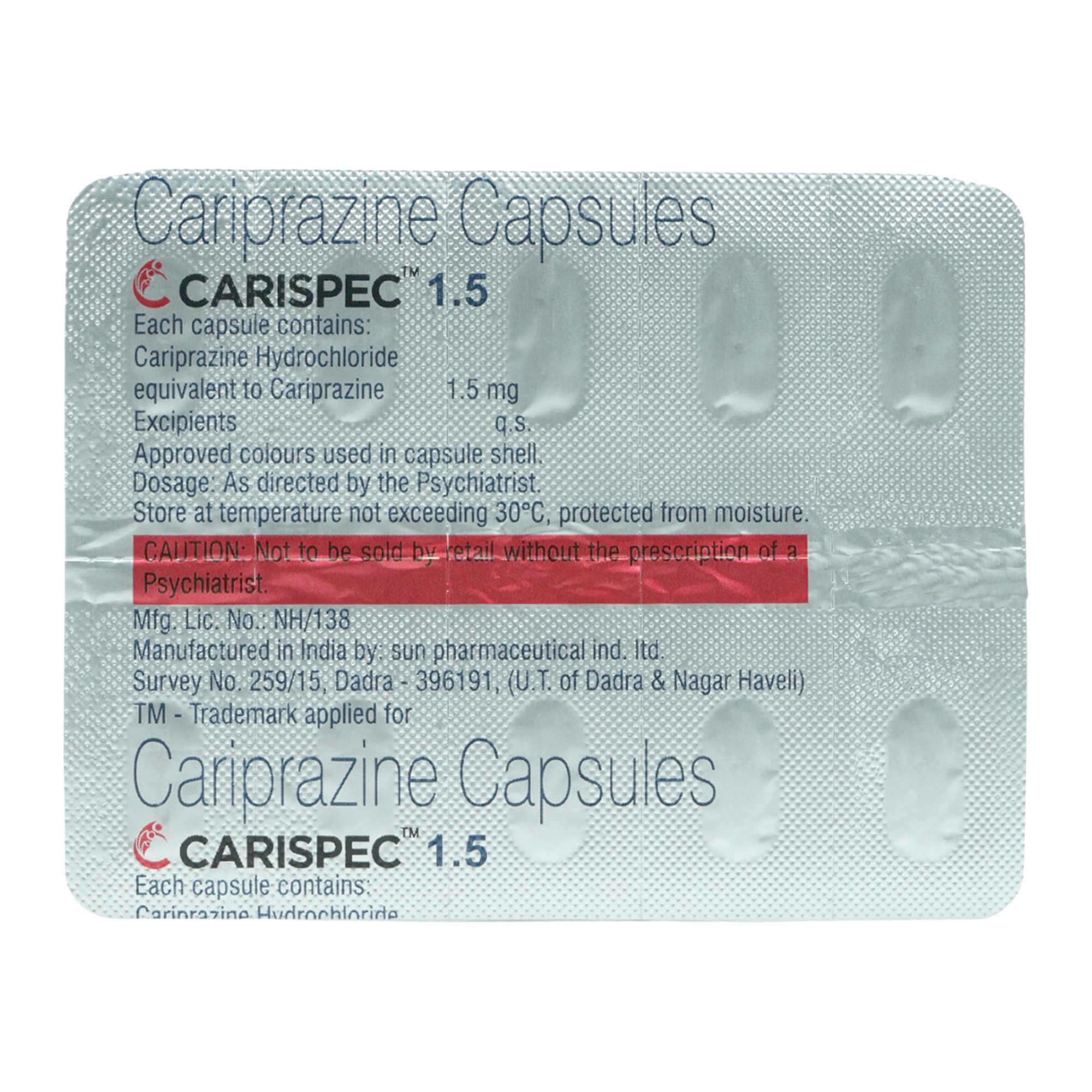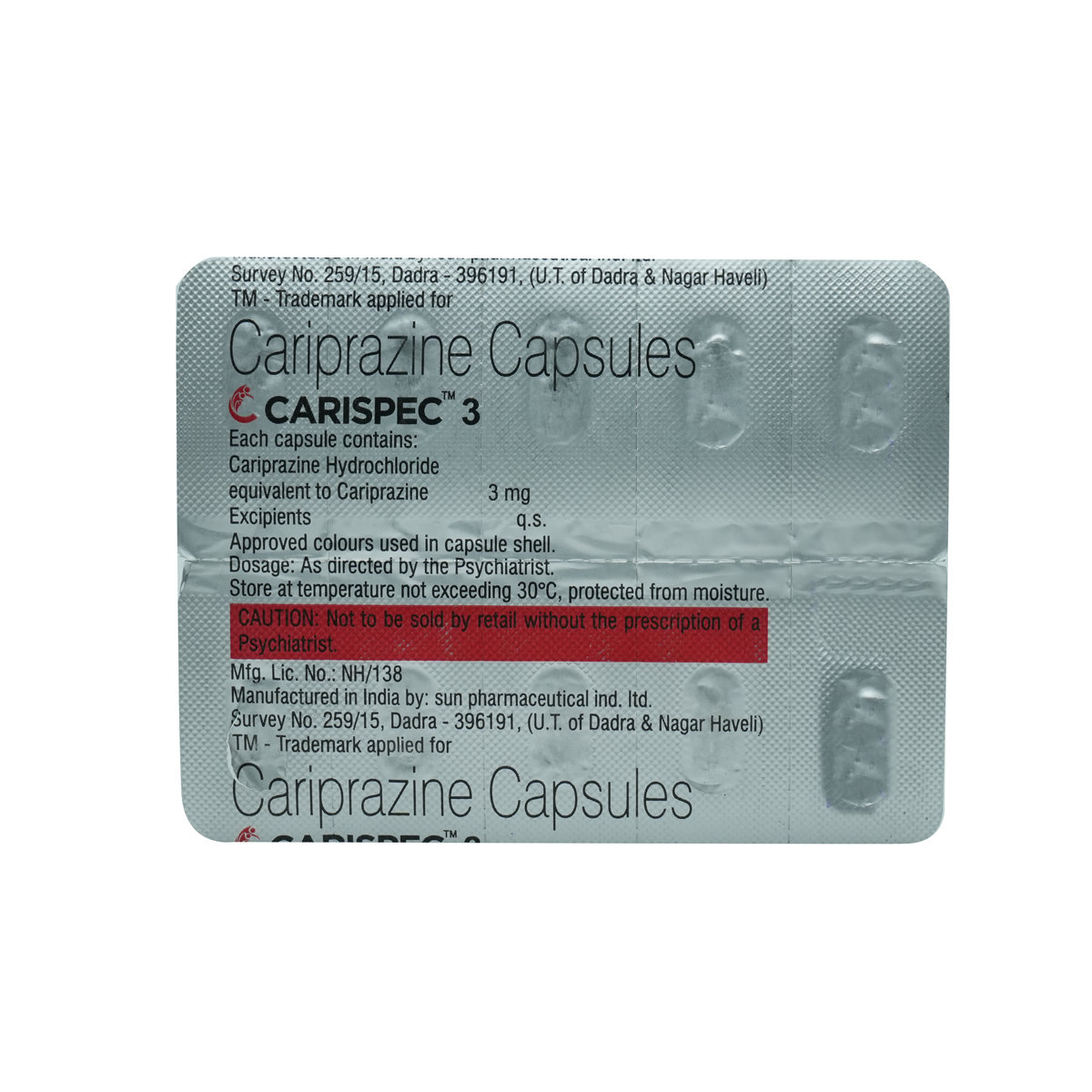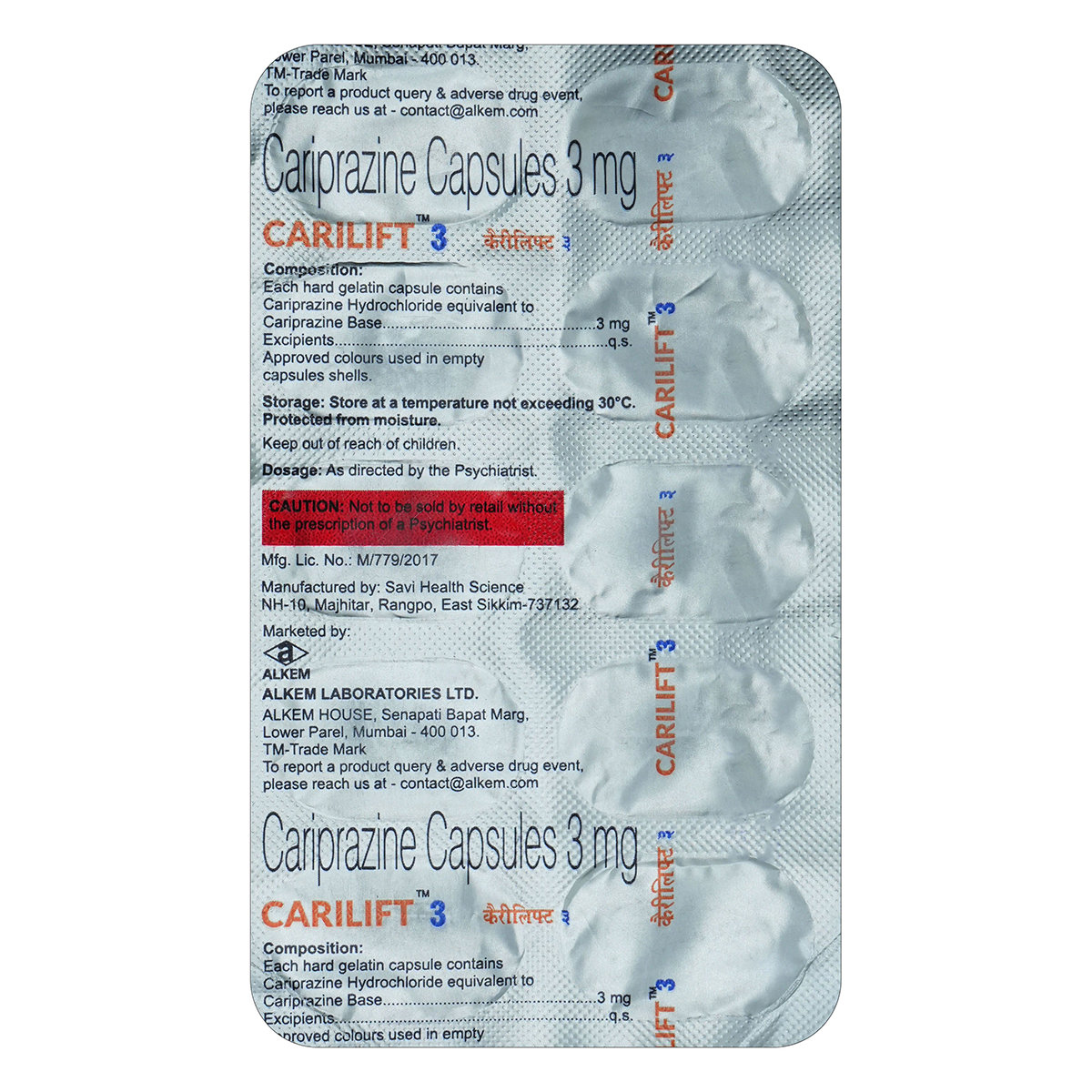Cariprazine
About Cariprazine
Cariprazine belongs to a group of medicines called 'antipsychotics,' primarily used to treat psychotic disorders like schizophrenia. It also treats manic or mixed episodes in adults with bipolar disorder type I.
Cariprazine consists of 'Cariprazine,' an atypical antipsychotic. It works by affecting the balance of the neurotransmitters in the brain. Thereby, Cariprazine decreases psychotic symptoms like hallucinations and agitated behaviour associated with schizophrenia. It also treats depressive episodes in bipolar disorder type I/bipolar depression in adults.
Your doctor will decide the dose and duration based on your medical condition and response to treatment. Common side effects include restlessness, tiredness, drowsiness, dizziness, tremors/shakiness, blurred vision, difficulty moving or slow movements, involuntary muscle movements, excess saliva/drooling, constipation, upset stomach, nausea, vomiting, increased appetite, weight gain. These side effects are not familiar to everyone and vary individually. If you notice any side effects that are not manageable, please consult your doctor.
Cariprazine is not recommended for treatment in patients with dementia-related psychosis. Inform your doctor before starting Cariprazine if you have a history of liver/kidney/heart diseases, stroke, high blood pressure, diabetes, high cholesterol levels, swallowing problems, low white blood cell count, or fits. If you are pregnant, planning pregnancy, or breastfeeding, inform your doctor before using Cariprazine. Avoid consuming alcohol while being treated with Cariprazine as it can make you dizzy or drowsy. Do not drive or operate machinery since this medicine can make you sleepy and interfere with your driving ability. The safety and efficacy of Cariprazine in children and adolescents under 18 years have not been established.
Uses of Cariprazine
Medicinal Benefits
Cariprazine is used to treat schizophrenia and associated psychotic symptoms. It contains Cariprazine, which affects the balance of the neurotransmitters in the brain. It helps in clear thinking and relieves psychotic symptoms like hallucinations in schizophrenia. It treats depressive episodes in bipolar disorder type I in adults. It is also an adjunctive therapy to antidepressants in treating major depressive disorder (MDD) in adults.
Directions for Use
Storage
Side Effects of Cariprazine
- Restlessness
- Tiredness
- Drowsiness
- Dizziness
- Tremors/shakiness
- Blurred vision
- Difficulty moving or slow movements
- Involuntary muscle movements
- Excess saliva/drooling
- Nausea
- Vomiting
- Constipation
- Upset stomach
- Increased appetite
- Weight gain
Drug Warnings
Cariprazine is not recommended for treatment in elderly patients with dementia-related psychosis. Before using Cariprazine, let your doctor know if you have a history of liver or kidney diseases, heart problems, stroke, high blood pressure, diabetes, high cholesterol levels, swallowing problems, low white blood cell count, obesity, dehydration, or fits. Please consult your doctor if you are pregnant, planning to conceive or a breastfeeding mother before starting Cariprazine. Avoid consuming alcohol during the treatment, as it might increase dizziness and drowsiness. Avoid driving or operating machinery, as this medicine may decrease your mental alertness, making you feel dizzy or drowsy. Cariprazine is not recommended for patients below 18 years of age as safety and effectiveness have not been established.
Drug Interactions
Drug-Drug Interaction: Cariprazine may interact with antifungals (ketoconazole, fluconazole), fits medicines (phenobarbital, phenytoin), and stomach emptying drugs (metoclopramide).
Drug-Food Interaction: Avoid consuming grapefruit juice to prevent any interactions. Do not consume alcohol while undergoing treatment with Cariprazine, as it could increase dizziness and drowsiness.
Drug-Disease Interaction: Cariprazine is not recommended in dementia-related psychosis and allergic reactions to Cariprazine.
Drug-Drug Interactions Checker List:
Safety Advice

Alcohol
unsafeAvoid alcohol consumption while using Cariprazine. Alcohol intake while being treated with Cariprazine, may cause increased dizziness and drowsiness. Please consult your doctor for more information.

Pregnancy
cautionUsing antipsychotic drugs during the third trimester of pregnancy may cause extrapyramidal (drug-induced movement disorders) and/or withdrawal symptoms in newborn babies. Please consult your doctor before taking Cariprazine if you are pregnant or planning to conceive. Your doctor will weigh the potential risks and benefits before prescribing Cariprazine.

Breast Feeding
cautionIt is not known if Cariprazine is excreted into breast milk. Please consult your doctor before taking Cariprazine if you are a breastfeeding mother.

Driving
unsafeCariprazine may make you feel dizzy or drowsy. Do not drive if you are not mentally alert or experience any symptoms that affect your ability to drive or operate machinery.

Liver
cautionLet your doctor know if you have any history of liver diseases or hepatic impairment when you are prescribed with Cariprazine.

Kidney
cautionLet your doctor know if you have any history of kidney diseases when you are prescribed with Cariprazine.

Children
unsafeCariprazine is not recommended for use in children and adolescents below 18 years of age as safety and effectiveness have not been established.
Habit Forming
Diet & Lifestyle Advise
- Maintain proper weight by following a healthy diet.
- Exercise regularly as it helps in less cognitive decline and brain volume loss.
- Avoid smoking and alcohol consumption.
- Try to avoid stress by practising meditation or yoga.
- Include fruits and vegetables in your diet as they contain antioxidants.
- Eat nutritious food as it helps in cognitive stimulation.
- Limit foods with high cholesterol and saturated fats.
- Cut down on sugar, salt and processed foods.
- Drink plenty of water.
- Follow a healthy lifestyle as it helps improve overall health and possibly protects the brain.
Special Advise
- Cariprazine is not approved for the treatment of patients with dementia-related psychosis
- Let your doctor know that you are taking Cariprazine if you are undergoing any medical tests.
- Weight gain has been noticed in patients who use Cariprazine; hence, regular weight monitoring is recommended.
- Orthostatic hypotension is also recorded in patients using this medicine. Hence caution is recommended in patients with cardiovascular and cerebrovascular diseases.
- Cariprazine may affect blood glucose levels; hence it is advised to monitor blood sugar levels regularly while using Cariprazine.
- Timely monitoring of the cholesterol/triglyceride levels is advised for the patient while using this medicine.
Patients Concern
Disease/Condition Glossary
Schizophrenia: It is a condition in which the person may see, hear or feel things that are not there, believe things that are not true, or feel unusually suspicious or confused. Symptoms include hallucinations, delusions, thought disorders, movement disorders, disorganised thinking, loss of interest, lack of emotions, etc. Schizophrenia is triggered by physical, genetic, psychological, and environmental factors. Patients suffering from this disease may require lifelong treatment. Treatment involves a combination of medications, psychotherapy and care services.
Bipolar I disorder: It is a serious brain disorder in which a person goes through unusual mood changes (mood swings) and frequent changes in his/her behaviour and thinking. The symptoms may last at least seven days (most of the day, nearly every day), or the manic symptoms are so severe that the person needs immediate hospital care. Treatment involves mood stabilizers, antipsychotics, and sometimes sedative-hypnotics.
FAQs
Cariprazine contains Cariprazine, an antipsychotic that affects the balance of neurotransmitters in the brain, thus improving mood, behaviour, and thoughts in schizophrenia.
Cariprazine may make you sweat less and can likely cause a heart stroke. Hence, limiting activities that cause overheating, like an exercise in hot weather or using hot tubs, is advised. Drink plenty of fluids and dress lightly.
Cariprazine can cause side effects like orthostatic hypotension (sudden lowering in blood pressure leading to dizziness on standing). If you experience this, do not try to stand up suddenly or start walking; instead, lie down and get up slowly only when you feel better. People taking Cariprazine are advised to monitor their blood pressure levels regularly to avoid such unpleasant events. It is also advised to be aware of a condition called tardive dyskinesia (uncontrolled movements of the face, lips, mouth, tongue, arms or legs) that may rarely occur while using this medicine.








